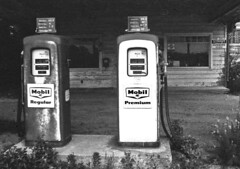 Image by januaryman via FlickrAs the new year approaches, I have to reflect upon a saying my 8th grade history teacher always use to say..."Those that don't learn from history are doomed to repeat it." Well I have to say that most of us aren't very good about learning from our past mistakes, as the recent scare about the economy is haunting us all. I thought I would share an article I found recently in an old magazine I have lying around. It was written in 1973 (sorry I didn't see the author's name), but from the sounds of it, you would have thought it might have come from today's paper. Here it is:
Image by januaryman via FlickrAs the new year approaches, I have to reflect upon a saying my 8th grade history teacher always use to say..."Those that don't learn from history are doomed to repeat it." Well I have to say that most of us aren't very good about learning from our past mistakes, as the recent scare about the economy is haunting us all. I thought I would share an article I found recently in an old magazine I have lying around. It was written in 1973 (sorry I didn't see the author's name), but from the sounds of it, you would have thought it might have come from today's paper. Here it is:Will the Automobile Survive?
“…the ecology movement would cost everyone much—and in many diverse ways. We are confirmed hobbyists when it comes to the antique, vintage and classic car field. How will ecology affect our hobby?
According to a recent article in the New York Times, the gluttonous American machine consumes something like 15-million barrels of oil per day with six million of that total ending up as gasoline. Can you believe that 40% of a 15-million barrel daily consumption is used as gasoline.
The automobile industry in America is indeed a giant—even a monster. Thinking of the automobile is always restricted to one's own interpretation, those nuances of thought as reflected through the eyes of the individual. Our mobility is based on wheels. Our livelihood is based on wheels. A major segment of the world's economy is based on wheels.
The current awareness of our environment demands that a nation categorize priorities. Gasoline consumption, air pollution, depleted oil reserves, a fuel shortage real or imaginary, balance of payments in world trade, all are gutsy problems that we must face now.
Ten million car production years do nothing but compound the problem. Even with a high built in obscence factor, attrition is such that a projected consumption ten years hence would be somewhere in the neighborhood of ten million barrels of gasoline per day. How long can the world's crude oil supply stand such unbridled consumption?
America is purchasing some 3.5 billions of dollars of foreign oil and that figure, assuming that some rational answer goes unfound, is expected to grow to a phenomenal 20-billion by 1980. It's just our opinion, but we really can't see how it can be healthy for our economy to buy foreign manufactured autos to burn middle-east shiekdom oil on American roads. Some of the present day word wranglers would probably say that our mind is boggled by the lower-midwest Protestant work ethic.
We would rather believe that the American public should face up to a growing problem that is doing exactly what the environmentalists have been preaching since Silent Spring sowed the seed of discontent. Somewhere along the line the American public took a wrong turn in its choice of automobiles. Many blame the corporate moguls in Detroit for all of the nation's environmental ills. This is hardly the case. It is an old truth in our nation's economy that there must be a buyer before one can sell. Detroit gave the auto buyers what they wanted. Thankfully, tastes can change. The predictors have all been basking in the sun of hindsight in seeing the car in our future as being the typical European sub-compact. High compression ratios and finely tuned engines seem to lose their glamour with anti-pollution devices. A happy medium would seem a more logical selection. Detroit has produced some highly efficient low pollutant engines in the past. They weren't 400 cid over square eights loaded with gadgetry. They were long in the category that produced honest, relatively trouble free transportation.
Another very non-European aspect of American motoring is that we love our highways and the vast expanse measured in thousands of miles—from sea to shining sea. Our state of Illinois is 4435 miles long. Travel that distance in Europe and one could pass through a half dozen governments. We think that our automobile problem is unique.
Even before the energy crisis and pollution, we would often look at a finely built automobile of another era and wonder if we have really gained anything but a little speed, a little convenience, and from the frequency of repair of some modern day cars—a lot of headaches.
How does all of this affect the old car buff? About the only way we can see is a possible curtailment in travels to meets. Should national gas restrictions come about, it is quite possible that recreational travel and gas consuming hobbies may bear the brunt. One point in our favor is that many of our older cars actually get more miles per gallon than the family car of today. And let's hope that the family car of tomorrow is as practical, well built and pollution free as some of our vintage automobiles.”
Just thought I would share this. While the media tries to scare us all I thought I would just offer an example that things haven't changed much and we are all still surviving. Happy New Year.
![Reblog this post [with Zemanta]](http://img.zemanta.com/reblog_e.png?x-id=25f31c92-524b-4d1c-b28a-86150d525483)
No comments:
Post a Comment